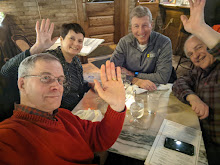
My Dad didn't talk too much about his past, a feature that may well have something to do with the fact I don't know that I ever asked.
Since my mom's death a little more than a week ago, I've vowed not to leave a pile of junk for my family to pore through.
Things that seem important at the time they were squirreled away, aren't really that important. Did I really need a dozen or so annual Oshkosh AirVenture official programs? I think not. So out they go.
I do recall, however, an anecdote about famed Berkshire congressman Silvio Conte, who died back in 1991 (aside: he came to our wedding). Upon cleaning out his sizeable desk in Washington -- he was ranking Republican on the House Appropriations Committee -- they found an entire drawer filled with nothing but drawings and notes from his children and grandchildren, archived through his 32 years in Congress.
That seemed like a nice thing for people to find -- proof that they mattered.
In my den, the bottom drawer of my file cabinet is filled with drawings and notes from my children. Don't tell them; let it be a surprise in the not terribly distant future.
Over the past few years, my mother has sent back to me, things that she either saved during my childhood, or things I sent her during my adulthood. Most of them don't matter much to me. But they mattered to her and this was her way of saying these things mattered to her. This is the language the Collins clan speaks, what with sons not asking questions when they had the chance and all.
In the process of throwing stuff out today, I came across The Book of Myself, which I believe Carolie and I gave to my father one year for his birthday, to encourage him to tell his story.
My dad was big on diaries and documenting his day.
This book, however, asked a question on each page, the totality of which would be the Book of Himself if the person answered the question in the blank space provided.
My dad was not a big fan of following instructions, however.
On the page titled "One of my dad's strongest traits was..." he wrote:
"Transplated 30 boxes including Rutgers-Marglobe Tomatoes plus butternut squash. Repaired gas leak in greenhouse. Eileen went to Spags today."
"May 5, 1997," he added so that we would never forget the great butternut squash planting of 1997 in my family.
On a page on which he was to answer the question, "The Best Part About Marriage Is...", he reported that it was Monday January 3, 2000 and that it was "unusually warm outside" and that the person who had been renting my grandmother's trailer had brought him $375 for the rent. In cash.
Nothing says lifelong romance like some greenbacks you don't have to report to the IRS.
It's the most Greatest Generation diary in the history of the Greatest Generation.
Anyway, I was cleaning out a book case, denying my children and future heirs the chance to read about what was to happen at the 2009 Oshkosh Airventure, when I found these two pieces of paper tucked in the book.
My father's life. Or at least his childhood.


(You can click on the images and get a bigger version)
My father, you can probably tell, wasn't much of a storyteller. I don't know when this was written, but clearly it was a time when he wanted his story to be known, if not then, at some future date, perhaps. Now, for example.
As we clean out my mother and father's house for a last time, I'll be digitizing all the documents and photographs for whomever in the future might want them. Better, I suppose, than piles of shoeboxes and old albums.
I've got a few of those with my story, too, though one of my retirement projects is to get those reduced to the digital form.
I've lamented for years that my former employer ignored 20 years of my calls for its digital archive to be preserved before it fell to dust with web site redesigns and changing technology that made it valueless. The last dozen years of my life is tucked in there too with a blog whose archived future remains somewhat cloudy.
Then there's this blog too, which, of course, Google could decide to terminate at any time.
We are told that younger people today don't want any of their parents' -- or grandparents' -- stuff. The technology that allows us to capture every 7 seconds of our lives, is also the technology that makes it easier to delete it all.
History vanishes at an ever-quickening pace, making it harder for the future to know that we were once here.
Planting squash.































